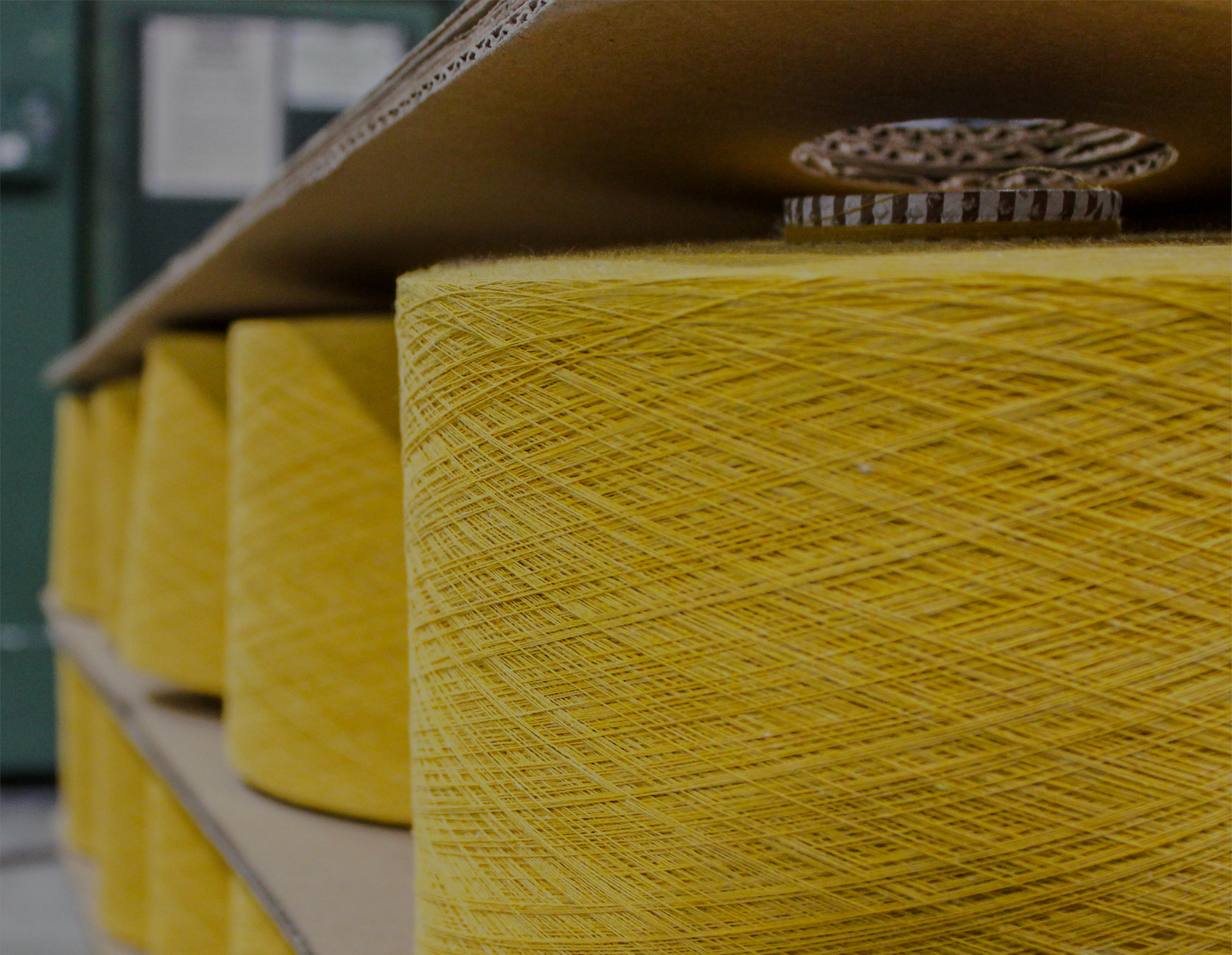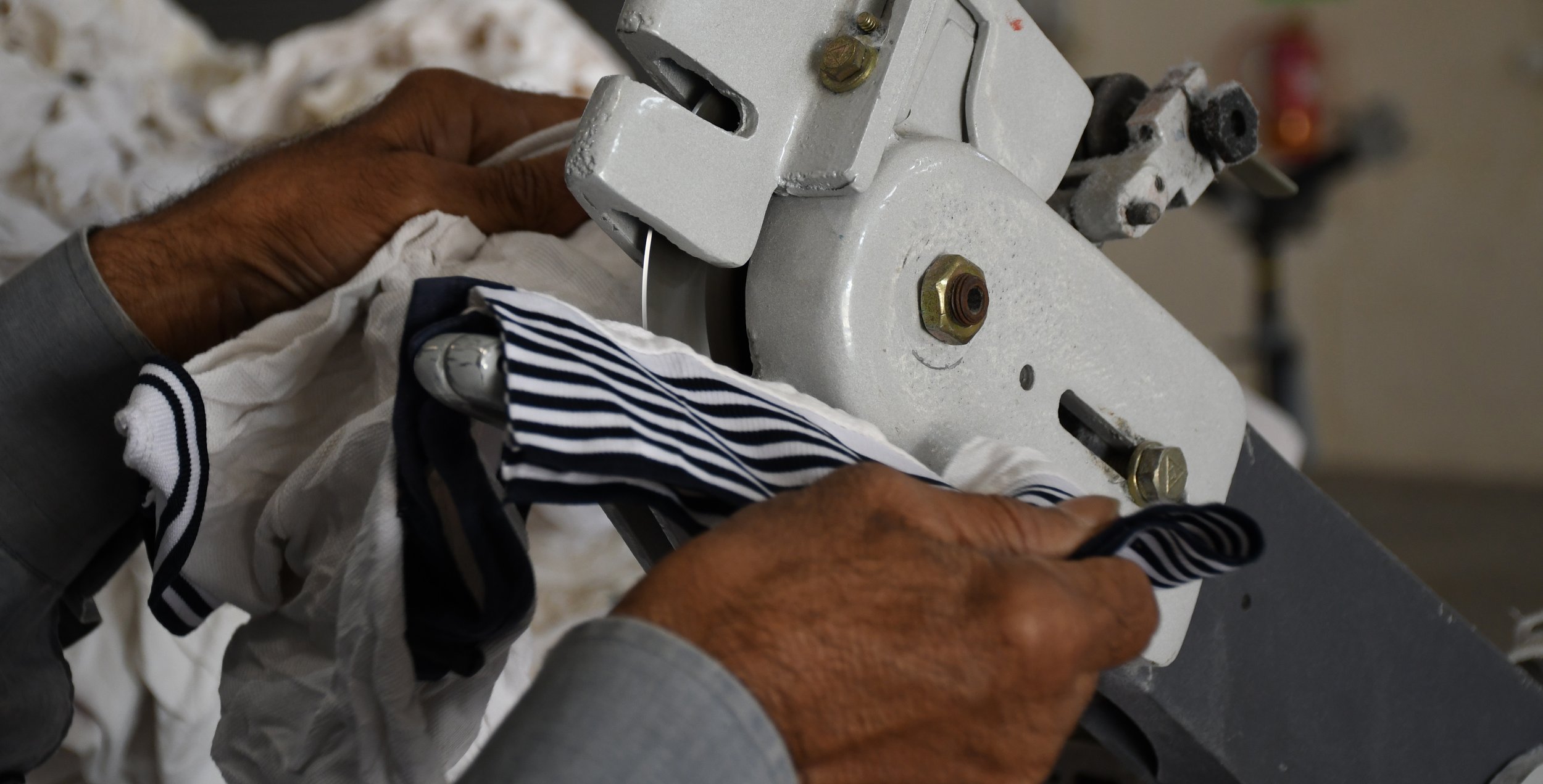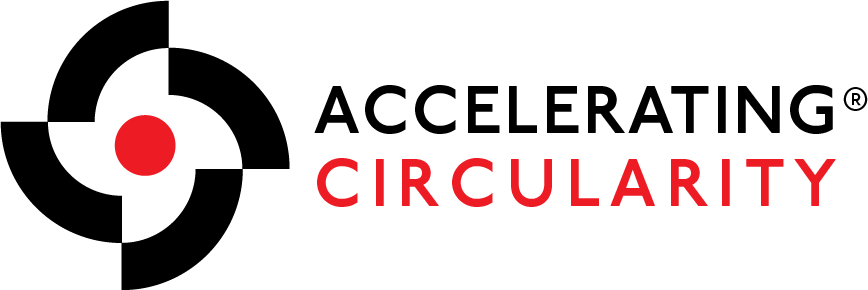
RESOURCES BY ROLES
We're excited to present a more streamlined experience designed to help you quickly find the tools, reports, and learning resources most relevant to your role in the circular economy.
Whether you're a brand looking to integrate circular principles into your products, a collector or sorter improving recycling processes, a manufacturer seeking sustainable materials, a tech and equipment supplier developing innovative solutions, or a funder enabling circular initiatives, you'll find dedicated sections to support your circular journey.
Navigate to the section most relevant to you, and let's accelerate circularity together.
BRANDS
Accelerating Circularity is a global non-profit dedicated to collaborating with the textile industry to design and implement circular solutions that eliminate textile waste and pollution, keep products and materials in use, and reduce the need for growing or manufacturing new fibers. By embracing circular practices and partnering with Accelerating Circularity, brands can unlock a multitude of benefits that extend far beyond environmental sustainability. Here's how:
ENHANCE BRAND REPUTATION AND CUSTOMER LOYALTY
In today's socially conscious market, consumers increasingly demand sustainable and ethical products. By demonstrating a commitment to circularity, brands can attract eco-minded consumers, build trust, and foster long-term loyalty.
DRIVE INNOVATION
AND COMPETITIVENESS
Circularity encourages innovation in product design, materials, and processes. By collaborating with Accelerating Circularity, brands gain access to cutting-edge research, industry expertise, and a network of innovators, enabling them to stay ahead of the curve and develop groundbreaking circular solutions.
MITIGATE RISK AND ENSURE FUTURE-PROOFING
The linear "take-make-dispose" model is increasingly vulnerable to resource scarcity, price volatility, and regulatory changes. Embracing circularity helps brands mitigate these risks by reducing dependence on virgin resources and ensuring compliance with evolving environmental regulations.
UNLOCK NEW REVENUE STREAMS AND BUSINESS MODELS
Circularity opens doors to new business opportunities, such as repair services, take-back programs, and resale platforms. By rethinking traditional business models, brands can tap into new revenue streams and create value from products throughout their lifecycle
By embracing circularity, brands play a vital role in addressing pressing global challenges, such as climate change, resource depletion, and pollution. By working with Accelerating Circularity, brands become part of a collective effort to create a more sustainable and resilient industry.
CONTRIBUTE TO A SUSTAINABLE FUTURE
RESOURCES
Brands interested in collaborating with Accelerating Circularity have a variety of opportunities to engage and contribute to the circular economy:
COLLABORATION OPPORTUNITIES
1. Join a Trial
Participate in one of Accelerating Circularity's groundbreaking trials to test and refine circular solutions in commercial settings. Trials offer a unique opportunity to gain hands-on experience, collaborate with industry peers, and contribute to the development of scalable circular systems.
2. Become a Member
Join Accelerating Circularity's global network of innovators, thought leaders, and change-makers. Collaborate on strategic initiatives. Gain access to exclusive resources, networking opportunities, and a platform to shape the future of the industry and drive systemic change.
3. Fund Our Work
Support Accelerating Circularity's research, trials, and educational initiatives through financial contributions. Your support enables us to accelerate the transition to a circular economy and create a more sustainable future.
4. Share Your Expertise
Contribute your knowledge and skills by participating in committees, working groups, or advisory boards. Your insights and perspectives are invaluable in shaping our initiatives and driving circular innovation.
No one company can do this alone. Brands can play a leading role and unlock new opportunities by being part of the circularity team.
COLLECTORS, SORTERS AND PREPROCESSORS
Collectors, sorters and preprocessors are a well established industry for reuse, wipers and shoddy. They are now playing a new crucial role in the circular economy for textiles by acting as a bridge between consumers, retailers and the burgeoning textile-to-textile (T2T) recycling market. By actively participating in these activities, collectors and sorters play a vital role in closing the loop for textiles, enabling the transition to a circular economy and a more sustainable future for the textile industry. Here's how they participate and contribute to the industry:
Collectors establish convenient collection points for consumers to drop off unwanted textiles, such as clothing, linens, and other textile products. This can include partnerships with retailers, municipalities, or dedicated collection bins.
EFFICIENT COLLECTION
Sorters meticulously categorize collected textiles based on factors like material composition, quality, and reusability. This step is essential for ensuring that textiles are directed to the appropriate recycling or reuse channels.
EFFECTIVE SORTING
Preprocessors remove contaminants and right-size materials as a fit for targeted recycling technologies.
TARGETED PREPROCESSING
Quality Control
Sorters and preprocessors identify textiles suitable for specific T2T recycling processes, ensuring they meet the quality standards required for processing. This may involve removing non-textile materials, right sizing, separating blends, and grading textiles based on their condition.
Aggregation and Consolidation
Collectors and sorters aggregate sorted textiles into larger volumes, making them more attractive to T2T recyclers who require substantial quantities of feedstock for efficient processing.
PREPARING FOR THE T2T MARKET
CONNECTING WITH RECYCLERS; BUILDING RELATIONSHIPS
Collectors and sorters establish relationships with T2T recyclers, understanding their specific material requirements and quality specifications.
TOOLS
Collectors, sorters and preprocessors actively participate in Accelerating Circularity’s industry initiatives to stay informed about the latest developments, best practices, and technological advancements in T2T recycling. They may participate in research projects and trials aimed at improving sorting and recycling processes, contributing to the overall advancement of the circular textile economy. Collectors, sorters and preprocessors interested in collaborating with Accelerating Circularity have a variety of opportunities to engage and contribute to the circular economy:
COLLABORATION OPPORTUNITIES
1. Join a Trial
Participate in one of Accelerating Circularity's groundbreaking trials to test and refine circular solutions in commercial settings. Trials offer a unique opportunity to gain hands-on experience, collaborate with industry peers, and contribute to the development of scalable circular systems.
2. Become a Member
Join Accelerating Circularity's global network of innovators, thought leaders, and change-makers. Collaborate on strategic initiatives. Gain access to exclusive resources, networking opportunities, and a platform to shape the future of the industry and drive systemic change.
3. Fund Our Work
Support Accelerating Circularity's research, trials, and educational initiatives through financial contributions. Your support enables us to accelerate the transition to a circular economy and create a more sustainable future.
4. Share Your Expertise
Contribute your knowledge and skills by participating in committees, working groups, or advisory boards. Your insights and perspectives are invaluable in shaping our initiatives and driving circular innovation.
No one company can do this alone. Collectors, sorters, and preprocessors can play a leading role and unlock new opportunities by being part of the circularity team.
CHEMICAL TEXTILE RECYCLERS
Chemical textile recyclers play a crucial role in the circular economy by transforming textile waste into valuable resources. Through innovative recycling processes, they break down complex textile blends and recover reusable materials, reducing the need for virgin resources and minimizing textile waste. Here's how they contribute to a more sustainable textile industry:
ADVANCED RECYCLING TECHNOLOGIES
Chemical recyclers employ cutting-edge technologies, such as depolymerization and dissolution, to break down textile waste into its basic components. These technologies enable the recovery of valuable materials, including polyester, nylon, and cellulose, which can be used to create new textiles, reducing the demand for virgin resources.
Chemical recycling processes are particularly effective in addressing the challenges posed by complex textile blends, which are difficult to recycle using traditional mechanical methods. By breaking down these blends into their constituent materials, chemical recyclers enable the recovery and reuse of valuable fibers that would otherwise be lost.
ADDRESSING COMPLEX BLENDS
SCALING TEXTILE-TO-TEXTILE RECYCLING
Chemical recyclers are essential in scaling textile-to-textile recycling, as they provide the necessary infrastructure and expertise to process large volumes of textile waste and produce high-quality recycled materials. This scalability is crucial for creating a viable circular economy for textiles.
COLLABORATION AND PARTNERSHIPS
Chemical recyclers actively collaborate with brands, manufacturers, and other stakeholders across the textile value chain to ensure a steady supply of textile waste and to develop new applications for recycled materials. These partnerships are essential for driving innovation and creating a closed-loop system for textile recycling.
By diverting textile waste from landfills and incineration, chemical recyclers help to reduce greenhouse gas emissions, conserve water and energy, and minimize the environmental impact of textile production and disposal.
ENVIRONMENTAL BENEFITS
TOOLS
COLLABORATION OPPORTUNITIES
Chemical recyclers interested in collaborating with Accelerating Circularity have a variety of opportunities to engage and contribute to the circular economy:
1. Join a Trial
Participate in one of Accelerating Circularity's groundbreaking trials to test and refine circular solutions in commercial settings. Trials offer a unique opportunity to gain hands-on experience, collaborate with industry peers, and contribute to the development of scalable circular systems.
2. Become a Member
Join Accelerating Circularity's global network of innovators, thought leaders, and change-makers. Collaborate on strategic initiatives. Gain access to exclusive resources, networking opportunities, and a platform to shape the future of the industry and drive systemic change.
3. Fund Our Work
Support Accelerating Circularity's research, trials, and educational initiatives through financial contributions. Your support enables us to accelerate the transition to a circular economy and create a more sustainable future.
4. Share Your Expertise
Contribute your knowledge and skills by participating in committees, working groups, or advisory boards. Your insights and perspectives are invaluable in shaping our initiatives and driving circular innovation.
No one company can do this alone. Chemical textile recyclers can play a leading role and unlock new opportunities by being part of the circularity team.
TECHNOLOGY AND EQUIPMENT PROVIDERS
Technology and equipment providers are essential enablers of the textile-to-textile (T2T) transition, offering innovative solutions that address the key challenges of textile recycling and circularity. By providing these critical technologies and equipment, providers empower the textile industry to overcome the barriers to circularity, enabling the scaling of textile-to-textile recycling and contributing to a more sustainable and resilient future. Here's an overview of how they support this transformative shift:
FIBER IDENTIFICATION AND SORTING TECHNOLOGIES
Advanced technologies, such as near-infrared spectroscopy, computer vision, and artificial intelligence, enable rapid and accurate identification of fiber composition and quality, streamlining the sorting process and ensuring that textile waste is directed to the appropriate recycling streams.
TRACEABILITY AND DATA MANAGEMENT SYSTEMS
Digital platforms and software solutions provide traceability and transparency throughout the textile value chain, tracking the movement of materials, verifying sustainability claims, and enabling data-driven decision-making for circularity.
EQUIPMENT FOR TEXTILE PROCESSING
Specialized equipment, such as shredders, balers, and cleaning systems, facilitate the efficient processing of textile waste, preparing it for recycling and ensuring the quality of recycled materials.
RESEARCH AND DEVELOPMENT
Technology and equipment providers invest in research and development to continuously improve and innovate recycling technologies, addressing the challenges of complex blends, dyes, and finishes, and developing new solutions for textile circularity.
Robotic and automated sorting systems increase the efficiency and accuracy of textile sorting, reducing manual labor and improving the quality of sorted materials for recycling.
AUTOMATED SORTING SYSTEMS
TEXTILE RECYCLING TECHNOLOGIES
Innovative recycling technologies, such as chemical recycling, enzymatic recycling, and mechanical recycling, enable the breakdown of textile waste into reusable fibers, yarns, or fabrics, reducing the need for virgin resources and minimizing waste.
TOOLS
Technology and equipment providers interested in collaborating with Accelerating Circularity have a variety of opportunities to engage and contribute to the circular economy:
COLLABORATION OPPORTUNITIES
1. Join a Trial
Participate in one of Accelerating Circularity's groundbreaking trials to test and refine circular solutions in commercial settings. Trials offer a unique opportunity to gain hands-on experience, collaborate with industry peers, and contribute to the development of scalable circular systems.
2. Become a Member
Join Accelerating Circularity's global network of innovators, thought leaders, and change-makers. Collaborate on strategic initiatives. Gain access to exclusive resources, networking opportunities, and a platform to shape the future of the industry and drive systemic change.
3. Fund Our Work
Support Accelerating Circularity's research, trials, and educational initiatives through financial contributions. Your support enables us to accelerate the transition to a circular economy and create a more sustainable future.
4. Share Your Expertise
Contribute your knowledge and skills by participating in committees, working groups, or advisory boards. Your insights and perspectives are invaluable in shaping our initiatives and driving circular innovation.
No one company can do this alone. Technology and equipment providers can play a leading role and unlock new opportunities by being part of the circularity team.
FUNDERS
Accelerating Circularity is a global non-profit dedicated to collaborating with businesses to design and implement circular solutions that eliminate textile waste and pollution, keep products and materials in use, and regenerate natural systems. Our mission is to create a sustainable and resilient industry through circular practices. We believe that a circular economy for textiles is essential to addressing the pressing global challenges of climate change, resource depletion, and pollution. Financial support is the lifeblood of Accelerating Circularity, enabling us to fulfill our mission of driving textile circularity through innovation and collaboration.
FUNDING DIRECTLY CONTRIBUTES TO
Pilot Projects and Trials
Funding the implementation of pilot projects and trials that test and refine circular systems in real-world settings, demonstrating their feasibility and scalability.
Industry Collaboration
Facilitating partnerships and collaborations with brands, retailers, manufacturers, and other stakeholders to drive the adoption of circular practices throughout the textile value chain.
Advocacy and Education
Supporting policy advocacy efforts to promote supportive regulations and incentives for textile circularity, as well as educational initiatives that raise awareness and build capacity for circular practices.
By supporting our work, you can help us create a more sustainable and resilient industry for generations to come. Our funding needs include programmatic grants to facilitate an accelerating of the global textile economy as well as:
Core Grants
Accelerating Circularity has a proven track record of success and impact along with responsible fiscal management. We have demonstrated that textile to textile value chains can produce new products at scale and are looking to expand our reach. We are seeking a core grant to support our research, trials, and educational initiatives. This funding will enable us to accelerate the transition to a circular economy and create a more sustainable future.
Pilot Project Sponsorships
Opportunities for brands and organizations to sponsor pilot projects and trials that align with their sustainability goals.
General Donations
Contributions to support Accelerating Circularity's overall operations and initiatives.
Endowment and Legacy Giving
Options for long-term investments in the organization's future.
FUNDING OPPORTUNITIES
Our Annual Reports are available here.
Summary of Impact Highlights
Environmental Benefits
Projected significant reductions in textile waste, water usage, energy consumption, and greenhouse gas emissions achieved through proposed circular initiatives.
Economic Impacts
Depending on supply chain operations, opportunity for cost savings and new revenue streams resulting from the implementation of circular business models and practices.
Social Contributions
Positive social impacts, such as improved working conditions, community engagement, and contributions to a more sustainable and equitable textile industry. Accelerating Workforce Development in the U.S. Circular Textile Economy.
Technological Advancements
Breakthroughs in textile recycling technologies, automated sorting and preprocessing methods, and circular solutions that have been developed and scaled with the support of funding.
RESOURCES

